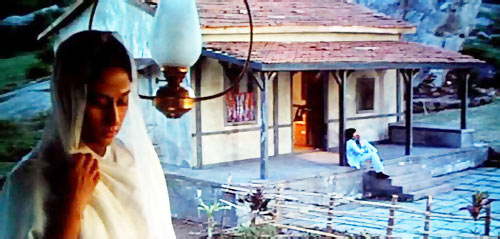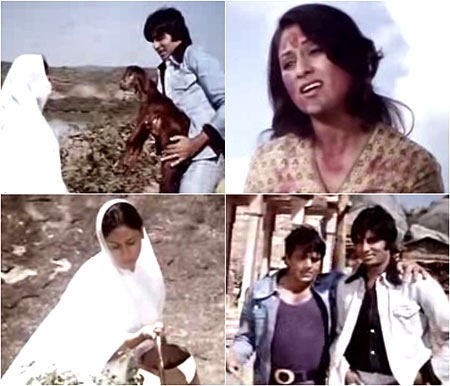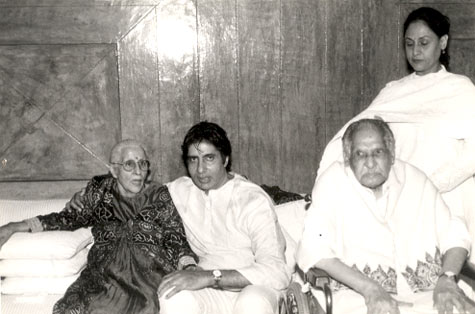On this happy occasion, we decided to go back in time to the moment when Amitabh Bachchan's mother Teji Bachchan was pregnant with him, and when Jaya Bachchan was pregnant with Shwetabhari.
Let's start with Jaya Bachchan. Here's presenting an excerpt from the book Sholay: The Making of a Classic by Anupama Chopra.
October 3rd was the first day of work. Sholay's first shot was a contrite Amitabh returning the keys to the safe to Jaya. This little scene is one of the two in the entire film when Jai speaks to the widow, Radha, and it is the start of their love story.
Jaya was three months pregnant at the time. Amitabh had driven her up the bumpy unpaved road to the Thakur's house in a four-wheeler himself. He wanted to make sure that she was comfortable.
He wasn't very enthusiastic about the location, and Jaya's condition was not the only reason why. Amitabh did not think that an untested and unconventional location like Ramanagaram was appropriate for a film like Sholay. 'You normally associate dacoits and hired killers with a setting like Rajasthan,' he says, 'and this was totally contrary --green, with big boulders... I thought, Ramesh Sippy has really lost it.'
While Jaya struggled with morning sickness and rough roads, Hema struggled with reams of dialogue. Basanti talked non-stop. And Hema just couldn't get the lines and the style right. 'Yeh itna lamba lamba dialogue kaun bolega? (Who's going to speak such long dialogues?)' she said. 'Surely, you will cut some of it out?'
Excerpted with permission from Penguin Books India from Sholay: The Making of Classicby Anupama Chopra. Imprint: Viking. Price: 795.
Please ...Jaya often got late-night cravings for biryani
Image: Jaya and Amitabh Bachchan in SholaySuresh Malhotra, the Bangalore distributor, invariably had some local invitation in place. Suresh, a portly man with a thick voice, had a grand passion for both films and food.
An old Sippy confidant, he had been distributing their films since Andaaz. Master of ceremonies and culinary guide, Suresh organised the evening outings.
The Sholay unit was making waves, and Bangalore's society ladies were clamouring to have them over. If there wasn't a party, the crew trooped to restaurants -- a favourite was a roadside dhaba called Roomali, which served a biryani tasty enough to warm your stomach and your soil.
Jaya, slowly swelling, often got late-night cravings for the biryani and Amitabh and Dharmendra were her escorts. On one such midnight meal excursion, their car broke down. They made it back to the hotel in an autorickshaw.
Please ...'I'm going to cancel this schedule, primarily for Jaya'
Image: Some scenes from SholayJaya had delivered in March. Her plump, glowing-with-motherhood face hardly suited the character of the emaciated that Ramesh had in mind. Obviously it wasn't going to work.
Ramesh then made a significant decision. He gathered his crew and said, 'Look, there's a lot going wrong here. I'm going to cancel this schedule, primarily for Jaya. But all of you call your secretaries and shift your dates around. Because the next time I come to Bangalore, I want to finish the film. It may take one month or two or three for us to get everyone together, but the next time we come, we go back with the film.'
Please ...
'Teji was alone at one of the most critical moments of a woman's life'
Image: A family portrait: Amitabh, Jaya, Abhishek and ShwetaI laugh now to remember that we had to open a book to ascertain whether a particular pang reported by Teji was a labour pain or attributable to some other cause! We learnt that labour pains are sporadic, not continuous, that they begin in the back and move forward.
Finding that this description tallied with Teji's symptoms, I went for the lady doctor, who drove Teji to the nursing home. Once again, Teji was alone at one of the most critical moments of a woman's life; but she did not lose heart, and after many hours' difficult labour, she gave birth to a son in the early afternoon.
Pantji (the famous Hindi poet Sumitranandan Pant) had come to our house during the day, as arranged. In the evening he visited the mother and child, and when he saw the baby boy, he gave him the name 'Amitabh'.
Excerpted from In The Afternoon Of Time, An Autobiography, by Harivansh Rai Bachchan, Penguin India, with the publisher's permission, Rs 450.
Please ...
'The birth of children early in a marriage has drawbacks as well as advantages'
Image: Amitabh and Jaya with Teji and Harivansh Rai BachchanI don't know how people react to fatherhood in the normal scheme of things, but in my very particular circumstances my predominant feeling was that while I had been alone all this time (even marriage itself being a kind of unified duality), I was now at last connected with society, with a collectivity, with humanity at large whereas had previously been backward-looking, or at best had concerned myself with the present, I had now attained a future focus.
It would be revealing to know how many bachelors, impotent or childless men there are amongst the camp-followers of invidualistic, time-bound existentialism!
When a woman becomes a mother, she gives pride of place to her offspring, and her husband becomes secondary; many husbands will know the sense of loss that I encountered on being ousted from the primary position I had held in Teji's life.
The pleasant shock of Amitabh's arrival had come before my craving for time alone with Teji had been satisfied, making me realise that the birth of children early in a marriage has drawbacks as well as advantages.
Two things compensated me for the loss I had sustained; Pantji's company and my own poetry.






Comment
article